Contact us today:
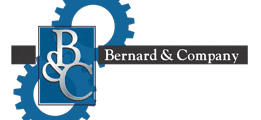
(847) 934-4500
tdaro@bernardandcompany.com

Contact us today:
(847) 934-4500
tdaro@bernardandcompany.com

ANCA, a leading innovator in precision grinding solutions, is thrilled to announce the grand opening of its new state-of-the-art Technology Center in Korea. ANCA has offered local sales and service to customers across diverse industries for more than 30 years in the Korean market and opening the new facility is a significant milestone for the company as it expands its presence in the Asian market.
Jake Farragher, General Manager of ANCA Asia, says, “ANCA’s newest technology center is a commitment to our customers in Korea. This investment in our global infrastructure enables our team to deliver premium sales and service support to this important and growing market. We understand the importance of offering customers local support and at our new facility we can showcase the capability of our flexible grinding machines, world-leading software, and market-first automation solutions.”
“Thanks to our long-standing partnership with SH International in Korea, we have a legacy of innovation with our customers in the market, and our local team at our new ANCA office is poised to facilitate our customers’ success into the future.”
“We are excited for our new center to serve as a hub for grinding excellence, innovation and collaboration, confirming our position as a global leader in the tool and cutter grinding industry and medical tools industry.”
For 50 years ANCA has committed to providing cutting-edge grinding solutions worldwide, and ANCA Korea, located near Seoul, is equipped with the latest technologies, such as ANCA’s ULTRA technology with nanometer resolution control.
The demonstration facility provides the ULTRA experience with ANCA’s MX and FX ULTRA machines, as well as automation solutions with ANCA’s Integrated Manufacturing System (AIMS). The facility additionally includes support and training services.
The grand opening event was attended by key stakeholders and customers, industry partners, and local dignitaries.
Celebrating 50 Years and Innovating the Future with ULTRA Technology
Pat Boland, ANCA Co-founder said: “50 years ago, Pat McCluskey and I did not anticipate ANCA to be what it is today. We embarked on a business journey that felt in hindsight like stepping onto a treadmill, with our customers driving the speed. Yet we have not only kept pace with the market, we’ve surged ahead, introducing cutting-edge innovations. I am proud of the technology we are still releasing, such as the ULTRA and GCX packages and the many innovations that underpin these product releases.”
Edmund Boland, General Manager of ANCA CNC Machines and son of Pat Boland, highlighted ANCA’s agility as a privately owned company, enabling swift decisions to support ANCA’s people and customers.
“ANCA has always endeavored to stay ahead of the curve, anticipating market trends, and delivering cutting-edge solutions that enable our customers to thrive,” Edmund said. “With 50 years of innovation behind us, our product and technology portfolios are perfectly positioned to meet the challenges of the future.”
ANCA’s 50th anniversary marks a half century of the company’s relentless pursuit of excellence and commitment to pushing the boundaries of precision grinding technology. The ULTRA machine range, with its nanometer technology, allows customers to produce the best tools in the market through superior accuracy, quality and surface finish.
The ANCA Integrated Manufacturing System (AIMS) is a groundbreaking advancement in grinding technology. AIMS connects, automates and creates all processes required to manufacture a cutting tool, ensuring maximum accuracy and consistency while minimizing downtime – enabling end-to-end digitally connected and automated production systems for cutting tools.
For media inquiries or more information, please contact:
Sepideh Zandieh
Acting Group Communications Manager
sepideh.zandieh@anca.com
Phone: 0439 316 131
About ANCA:
ANCA is a market leading manufacturer of CNC grinding machines. It was founded in 1974 in Melbourne, Australia where the company still has its global headquarters. ANCA has offices in the UK, Germany, China, Thailand, India, Japan, Brazil, Korea and the USA as well as a comprehensive network of representatives and agents worldwide.
ANCA CNC grinders are used for manufacturing precision cutting tools and components across a diverse range of competitive industries including cutting tool manufacture, automotive, aerospace, electronics and medical.
Continue reading
Truly optimizing medical machining often requires specialized cutters, and there’s no better model for designing and grinding them than ARCH Cutting Tools, headquartered in Warren, Michigan, USA.
Take the task of machining a polyethylene tibial insert. As ARCH Cutting Tools’s northeastern regional director of operations, Jim Gray, spelled out, this has almost always been done with a single, flat blade mounted in a holder so as to maximize the shear angle. But, said Gray, this design often produces lines on the surface, or an “orange peel” effect, due to burning, as it doesn’t cut the polyethylene as cleanly as desired. A straight flute design also impacts the part with a lot of force on each rotation.
Gray’s team instead used their knowledge and ANCA’s programming software to create a unique 1½” (38.1 mm) diameter 3-flute carbide helical cutter with high shear and multiple radii along the profile. They grind it on an ANCA MX7 machine, using a dozen wheels to create a mirror finish and a cutting edge “sharper than a razor blade,” as Gray described it. “You need a very sharp edge to cut the plastic perfectly cleanly. Even a diamond grain that goes through cutting edge, leaving a tiny chip, will show up in the insert. We inspect these tools under a microscope to confirm the edge is crisp and clean.” Gray added that their helical design also distributes the cutting forces, in contrast to a straight flute. In sum, the ARCH Cutting Tools solution delivers an outstanding part finish, higher throughput, and longer tool life.
Replicating perfection
Gray also pointed out that in addition to the tool design assistance derived from ANCA’s programming software, which includes full 3D simulation, the ToolDraft feature enables detailed documentation for process control. “Instead of relying on 2D drawings on the shop floor,” Gray expounded, “ToolDraft gives us the ability lay out every aspect of the tool and the required grinding wheels. One page covers the gullet shape, with the roughing wheel, the finishing wheels, and any information related to fluting. The next page covers profiling, again with all the wheel shapes and data, and the required clearance angles, land width, and other tool geometries. And so forth for the end face. We also add notes to each drawing to provide detail on what’s pertinent to this tool…what really makes it work.
“We love what ToolDraft does for us. Because if all you put out on the floor is a 2D drawing with an outside diameter or shape of the tool, the operator can say ‘This tool is good. It’s to print,’ when in reality, the body’s thin and the rake is not right. There are so many things that go into why we designed a tool a certain way, that if we don’t get complete information to the operator, everyone can have a different opinion about what constitutes a correct copy. We’ve promised our customers that no matter what person and what machine grinds their tool, they’ll get the same tool every time. And the only way we can keep that promise is with the documentation we’ve created with ToolDraft.”
Gray added that although it’s possible to grind such tools with a ball screw driven machine, it’s much easier to produce them with ANCA’s newer linear motor technology. “Linear motors have definitely changed our world when it comes to finishes and transitioning for profile cutters,” he explained. “They make it easier to grind the profile, especially with a tool like a condyle cutter, because multiple radiuses go up and over the edge. If you’re grinding in just one direction, a ball screw machine is fine. But if you go up and over and you need to produce multiple radiuses in the front and multiple radiuses in the back, that little backlash or wear in the ball screws will force you to fight until you get it all settled and tweaked in. Whereas with a linear motor machine, it’s just true from the start.”
Not all ball nose end mills are equal
Moving on to hip stems, Gray said machining up and over these parts requires ball nose end mills in which the radius and its transition to the OD must be perfect. The end face gashing must also meet exactly at the center. “Any mismatch in the center of the ball nose will put a line in the hip stem, and that’s not acceptable.” Any error in the radius will create geometrical distortion in the part profile, he added. “We scan that whole radius to ensure it’s correct.”
Hip stems have generally been made of titanium and cobalt chromium, Gray explained. These materials are challenging enough, but Gray said the new 3D printed titanium alloys from leading medical suppliers are even more difficult to machine. They’re porous, to facilitate integration with the patient’s bone, which essentially guarantees an interrupted cut. The material is also highly abrasive. Thus, minimizing tool changes and increasing manufacturing speed to achieve an acceptable level of efficiency requires an engineered solution from the likes of ARCH Cutting Tools.
Fast turn-around for custom tools and regrinds
In another example of ARCH Cutting Tools coming to the rescue, a customer suddenly ran out of an imported, replaceable head, keyseat cutter during production. ARCH Cutting Tools delivered a custom engineered, solid carbide version, with coating, in under 48 hours. In another case, ARCH Cutting Tools created a multi-step counterbore that combined 6 different operations in one tool for machining titanium and superalloys. Both examples again point to the power of combining experienced grinding professionals with ANCA’s software and machines to produce high quality medical devices that improve a person’s life.
Regrinding is yet another such area. Not only does ARCH Cutting Tools reliably return used tools to new condition, Gray said there are numerous cases in which they’ve actually improved upon the original tool. “One of our bigger medical customers was buying a faceted drill from one of the world leaders in cutting tools,” recalled Gray. “The drill was being used on titanium, and we put a roll point on it and made some other changes to the geometry that made the reground drill run better than the new tools.”
In this context, Gray praised ANCA’s integrated laser to automatically check for and correct errors in tool runout, and ANCA’s probing capability. In addition to probing coolant holes to ensure proper tool orientation for a regrind, Gray said ANCA makes it easy to probe the entire point profile to enable K-land grinding, a notoriously fiendish task. “You adjust how many points you want along that edge,” Gray expounded. “And if you’re manufacturing the tool, you can probe the profile once and store that data. From then on you don’t have to re-probe to produce a good K-land, until wheel wear becomes a factor.”
Wheel wear would cause the K-land to vary, Gray added, but he again pointed to the ease of re-probing the profile to make adjustments, plus the existence of wheel probes on their ANCA machines. “The wheel probe is absolutely awesome, because it takes human error out and it’s really accurate,” said Gray. The older method uses a measuring bar, and Gray recounted that operators all too often forgot which orientation they should use and destroyed an expensive wheel.
The science of productivity
As Gray put it, ARCH Cutting Tools has to be fast to be competitive, and that requires a process that’s “down to a science.” Things like matching different wheel specifications to the diverse tool materials they have to grind, proper coolant placement, and adaptable tool support. In the latter category, Gary praised ANCA’s P-axis traveling steadyrest and said that for some challenging applications they use an Arobotech, which grips the tool at 3 points and adjusts to changes in diameter as the P-axis moves below the grinding wheel, providing support. “These are all things that give us an edge to be able to do these instruments,” Gray concluded. “They virtually eliminate runout and allow us to run faster.”
But Gray reserves his highest praise for ANCA’s simulation software, calling it “the greatest tool…We used to go to the machine blind. We’d end up scrapping blanks to figure out these complex tools right at the machine. With ANCA’s software, you create complex tools before going to the machine and you’re close to perfect when you run your first part.”
From creative tool design, to efficient machine setup and operation, to tight quality control, ARCH Cutting Tools consistently exemplifies what it takes to meet the challenges of machining medical components.
Images
Condyle Cutter.jpg
ARCH Cutting Tools produces a unique 3-flute carbide helical cutter that delivers unequaled part finish, higher throughput, and longer tool life in machining a polyethylene tibial insert
Ball Nose End Mills.jpg
These ball nose end mills (for machining hip stems) feature a perfect transition from the ball radius to the OD, and an end face gash that meets exactly at the center
Key Cutter.jpg
ARCH Cutting Tools delivered this custom engineered, solid carbide keyseat cutter, with coating, in under 48 hours
Multi-Step Counterbore.jpg
ARCH Cutting Tools created this multi-step counterbore to combine 6 different operations in one tool for machining titanium and superalloys
Carbide Trepan Cutter.jpg
This complex trepan cutter was created to meet an urgent need for cutting non-ferrous material used in respiratory equipment. The tool features a very fine finish and leaves no marks on the part. Gray reported that “the customer was ecstatic”
For further information, please contact:
Amanda Bakun
Marketing & Communications Manager – Americas
248-497-1168
amanda.bakun@anca.com
ANCA is a market leading manufacturer of CNC grinding machines. It was founded in 1974 in Melbourne, Australia where the company still has its global headquarters. ANCA has offices in the UK, Germany, China, Thailand, India, Japan, Brazil, Korea and the USA as well as a comprehensive network of representatives and agents worldwide.
ANCA CNC grinders are used for manufacturing precision cutting tools and components across a diverse range of competitive industries including cutting tool manufacture, automotive, aerospace, electronics and medical.
Continue reading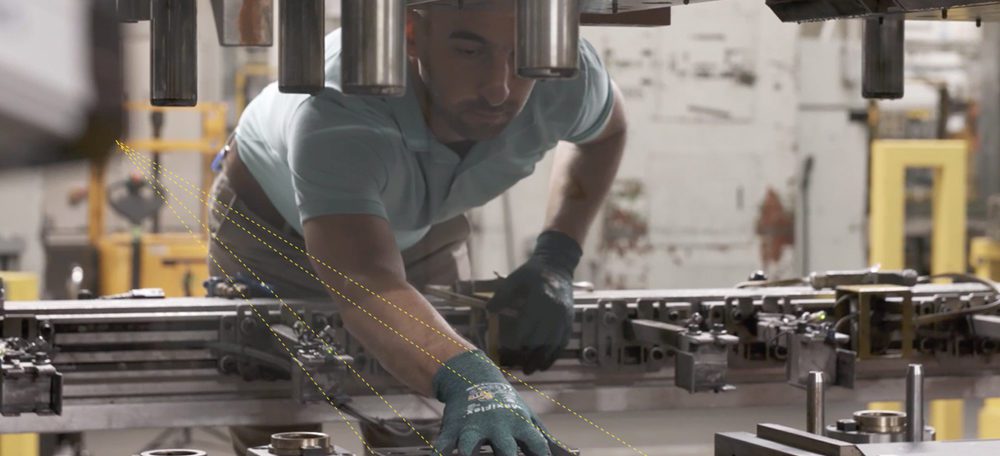
Schuler’s Digitalization & Modernization Workshop provided innovative and practical solutions for creating a fully networked press shop
Canton, MI, March 2, 2023—Schuler North America, subsidiary of Schuler Group GmbH, hosted a Digitalization & Modernization Workshop last week. The workshop was also the grand opening of Schuler’s Michigan Ave Service Facility.
Attendees included senior leaders, directors, and engineers from major OEM and Tier-One suppliers, the Supervisor from the Charter Township of Canton, Anne Marie Graham-Hudak, and senior editors from top trade publications.

Schuler’s Visual Die Protection (VDP) is a camera-based system designed to stop presses before damages or failures occur.
“We want our customers to take tangible information back to their shop and know that Schuler is available to support them in their digitalization journey,” states Kevin McAllister, President of Schuler North America. “I can safely say we achieved this objective based solely on the feedback we received. We will certainly host more workshops to support those that could not attend last week.”
Domenico Iacovelli, CEO of Schuler Group GmbH and Member of the Executive Board Andritz Group, and Kevin McAllister opened the workshop with a live press conference. Session topics included:
The Press Shop of the Future, presented by Tiago Vasconcellos, Sales Director at Schuler North America, identified key technologies used at Schuler’s Smart Press Shop that reshape costs, output, and carbon footprint. The Press Shop of the Future was instrumental in laying the foundation for the entire workshop as it provided attendees with the current market status and future expectations of digitalization.
Optimize Shop Floor Operations, presented by Andreas Gebele, Product Manager of Digital Automotive Solutions at Schuler Pressen GmbH, provided solutions to achieve increasements in availability, performance, and quality with Schuler’s Track & Trace, laser serialization, blank measurements, and downtime detection.
Protect Dies & Prevent Damages with VDP, presented by Samuel Czyzewski, Service & Digitalization Engineer at Schuler North America, included a live demo of Schuler’s Visual Die Protection (VDP) and the immediate ROI from the camera-based system’s capability to detect foreign objects, inspect processes, and monitor die functions.
The Shop Floor Tour, presented by Robert Tyler, Facility & Operations Manager at Schuler North America, gave attendees an inside look at the 32,000 sq. ft. facility’s 50-ton crane, in-house press pit for rebuilds and assembly, specialized equipment, and team of field service and engineering support at work.
Press Shop Planning with Cloud Solutions, presented by Andreas Gebele and Flavio Rudiger, Lead Digitalization Engineer at Schuler North America, included a live demo of Schuler’s machine applications that provide predictive maintenance to avoid efficiency losses and damage risks.
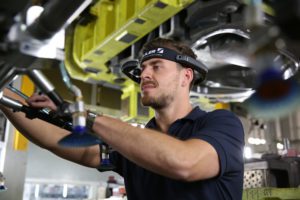
Schuler Connect provides remote service and troubleshooting support via smart glasses, smart phone, or tablet.
Get Proactive with Service Agreements, presented by Andy Osborn, Director of Modernization at Schuler North America, provided value-add predictive maintenance, remote service, and spare parts with Schuler’s Service Agreements. Two supporting topics included Schuler Smart Inspections, presented by Rodrigo DePaula Branco, Engineering Group Lead at Schuler North America, and Schuler Connect, a live demo of the smart glasses and application for safe and cost-effective remote support and troubleshooting, presented by Flavio Rudiger and Samuel Czyzewski.
Future Products, presented by Flavio Rudiger and Andreas Gebele, covered all Schuler Digital Suite products coming soon to the USA. Solutions included DIGISIM simulation software to increase productivity, Smart Assist to increase output, Smart Monitoring System (SMS) to detect machine stress from older equipment, Visual Quality Inspection (VQI) to detect part quality issues efficiently, and Service Portal to access contracts, warranties, technical equipment data, inspection protocols, service history, Schuler’s 24/7 helpline, and spare parts stock availability.
“The Digitalization & Modernization Workshop highlighted our local availability,” explains Telvi Zanin, Vice President of Service at Schuler North America. “Schuler North America has over 300 employees. We are the largest local OEM service support, and the grand opening of our new facility greatly enhances our capabilities for the local market.”
Website
About Schuler Group—www.schulergroup.com
Schuler offers customized cutting-edge technology in all areas of forming—from the networked press to press shop planning. In addition to presses, Schuler’s products include automation, dies, process know-how, and service for the entire metalworking industry. Schuler’s Digital Suite brings together solutions for networking forming technology and is continuously being developed to further improve line productivity and availability. Schuler customers include automotive manufacturers and suppliers, as well as companies in the forging, household appliance, and electrical industries. Schuler presses are minting coins for more than 180 countries. Founded in 1839 at the Göppingen, Germany headquarters, Schuler has approximately 5,000 employees at production sites in Europe, China and the Americas, as well as service companies in more than 40 countries. The company is part of the international technology group ANDRITZ.
Schuler’s global portfolio of world-renowned brands include BCN (Bliss Clearing Niagara) Technical Services, Müller Weingarten, Beutler, Umformtechnik Erfurt, SMG Pressen, Hydrap Pressen, Wilkins & Mitchell, Bêché, Spiertz Presses, Farina Presse, Liebergeld, Peltzer & Ehlers, Schleicher, and Sovema Group.
About Schuler North America—www.schulergroup.com
Schuler North America (Schuler), headquartered in Canton, Michigan, is the North American subsidiary of Schuler Group. Schuler provides new equipment, spare parts, and a portfolio of lifecycle services for all press systems—including preventative maintenance, press shop design and optimization, turnkey installations, retrofits for existing systems, and localized production and service. Schuler’s best-in-class position in the metalworking and materials industry serves automotive manufacturers and tier suppliers, as well as home appliance, electronics, forging, and other industries.
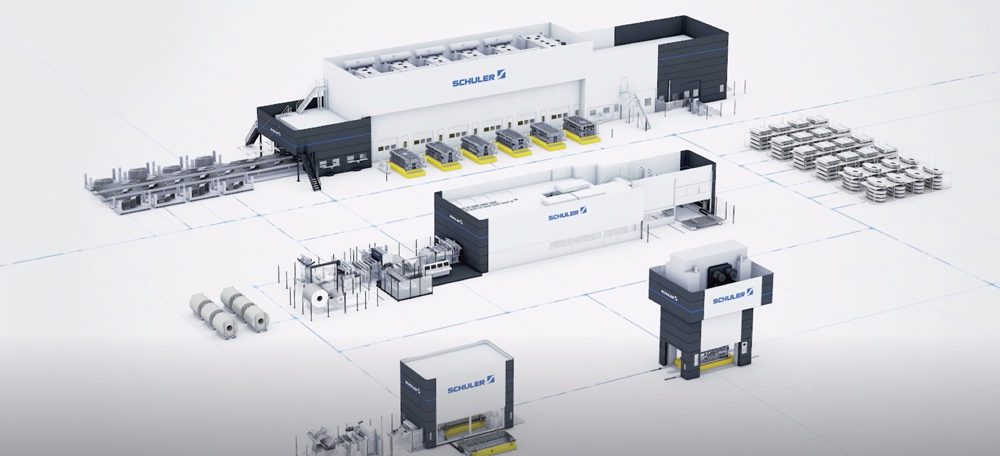
Schuler North America unveils digitalization and modernization best practices with an industry workshop and grand opening of new facility.
Schuler North America, subsidiary of Schuler Group GmbH, will host a Digitalization & Modernization Workshop on February 23, 2023. The workshop is also the grand opening of Schuler’s Michigan Ave Service Facility in Canton, Michigan.
Schuler will identify the press shop of the future and highlight key technologies that maximize overall equipment effectiveness (OEE), implement digitalization practices, and conduct smart press shop practices. Attendees will learn how the press shop of the future reshapes costs, output, and carbon footprint.
“Topics, and marketing buzz words, such as IIoT and digitalization have oversaturated the market,” states Telvi Zanin, VP of Service at Schuler North America. “Our Digitalization & Modernization Workshop provides the valued ‘how-to’ ingredient and is designed to help attendees build their own state-of-the-art press shop of the future.”
Schuler’s Digitalization & Modernization Workshop is a full, one-day event with various sessions that provide innovative and practical solutions for making press shops smarter. Session topics include:
The workshop also serves as the grand opening of Schuler’s Michigan Ave Service Facility. The facility is 32,000 sq. ft. and is equipped with a 50-ton crane, in-house press pit for rebuilds and assembly, specialized equipment, and full-time field service and engineering support hub.
“The Digitalization & Modernization Workshop is an opportunity to inform the market about Schuler’s Digital Suite solutions and how manufacturers can create a fully networked press shop. Concurrently, our new facility exemplifies Schuler’s capabilities to the local market,” explains Kevin McAllister, President of Schuler North America. “The Michigan Ave Service Facility enables reduced turnaround time for repairs, press rebuilds, and modernization projects. We created a convenient space for customer shipments, follow-ups, reviews, and buy-offs.”
The workshop and grand opening will begin with an on-site press conference and conclude with a cocktail reception for guests to meet with Schuler’s presenters and team of qualified experts.
Website
Schuler’s Digital Suite
Schuler Service
Schuler Modernization
About Schuler Group—www.schulergroup.com
Schuler offers customized cutting-edge technology in all areas of forming—from the networked press to press shop planning. In addition to presses, Schuler’s products include automation, dies, process know-how, and service for the entire metalworking industry. Schuler’s Digital Suite brings together solutions for networking forming technology and is continuously being developed to further improve line productivity and availability. Schuler customers include automotive manufacturers and suppliers, as well as companies in the forging, household appliance, and electrical industries. Schuler presses are minting coins for more than 180 countries. Founded in 1839 at the Göppingen, Germany headquarters, Schuler has approximately 5,000 employees at production sites in Europe, China and the Americas, as well as service companies in more than 40 countries. The company is part of the international technology group ANDRITZ.
Schuler’s global portfolio of world-renowned brands include BCN (Bliss Clearing Niagara) Technical Services, Müller Weingarten, Beutler, Umformtechnik Erfurt, SMG Pressen, Hydrap Pressen, Wilkins & Mitchell, Bêché, Spiertz Presses, Farina Presse, Liebergeld, Peltzer & Ehlers, Schleicher, and Sovema Group.
About Schuler North America—www.schulergroup.com
Schuler North America (Schuler), headquartered in Canton, Michigan, is the North American subsidiary of Schuler Group. Schuler provides new equipment, spare parts, and a portfolio of lifecycle services for all press systems—including preventative maintenance, press shop design and optimization, turnkey installations, retrofits for existing systems, and localized production and service. Schuler’s best-in-class position in the metalworking and materials industry serves automotive manufacturers and tier suppliers, as well as home appliance, electronics, forging, and other industries.
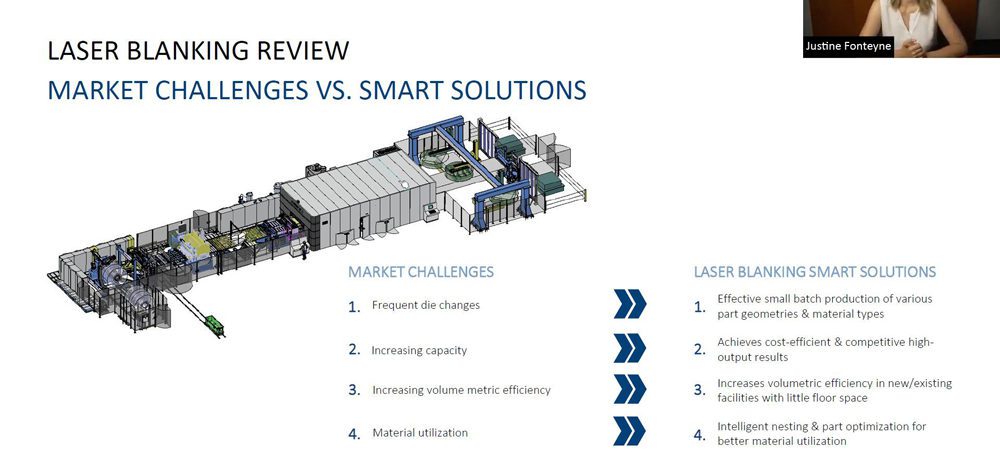
The technology offers maximum flexibility, efficiency and part quality, as well as material savings of up to one million USD per year
Canton, Michigan, July 27, 2022 – A blanking line is usually made up of a coil line, an uncoiler, a threading unit, leveler, roll feed, the cutting area and the stacking unit. This holds true with laser blanking lines, but the material is cut by a laser cell instead of a shear or press. Justine Fonteyne, Schuler’s Area Sales Manager of the Americas, has recently explained the technology’s multiple advantages in an online seminar.
There has been a rising interest for laser blanking lines, given the die-free blanking capabilities. Schuler has sold 15 worldwide, including five in North America. With the frequent changeover of new car models, vehicle manufactures are happy to avoid investing in expensive dies – especially new players within the EV market, for which ramp-up production may be slower. “And die change time costs production time,” Fonteyne underlined. Additionally, no dies equate to no die storage or maintenance, and less initial infrastructure investment as no heavy press foundation or loop pit is required. Apart from that, no noise or vibration is emitted.

Overall equipment efficiency of up to 80 percent
Because of Schuler’s Dynamic Flow Technology (DFT), Schuler’s laser blanking lines are also much faster than conventional stop and go laser cutting systems like flatbed lasers. The material runs continuously without the need to stop-and-start before cutting. The output can reach 45 parts per minute, depending on the geometry of the blank. Due to no die changes, the overall equipment efficiency (OEE) is up to 80 percent.
“Depending on the part mix, Laser Blanking can be the cheapest way of blanking,” Fonteyne stated. “Due to digital nesting solutions, the technology has much greater material utilization.” In contrast to conventional lines, the parts can be designed independently from die restrictions. Also separation strips can be avoided with edge-to-edge nesting. Improvements in material utilization of an outer body part mix of approximately 1 percent quickly add up to material savings of up to one million USD per year.
No wear of dies and presses
Schuler’s laser blanking lines produce homogenous cutting edges with hardly any burr. “This is relevant for aluminum because the flitter in the die is reduced to almost zero,” Fonteyne explained. The rising number of high-strength steel pose further challenges to conventional lines regarding the wear of dies and presses, but the lasers are not affected by this at all. Schuler offers workshops for part simulation and optimization as well as business calculation.
Fonteyne provided insight into Schuler’s Track & Trace solution that has already been implemented at the Smart Press Shop in Germany, a joint venture between Schuler and Porsche. “Being the first station for the material in the press shop, we start the tracking of the production data here,” said Fonteyne. “The production data is connected to every part and can be tracked easily and continuously. For example, data pertaining to the thickness of a blank or the amount of oil distributed can be transmitted to the press line in order to achieve a perfect forming process.
Watch the complete video of the online seminar here: https://youtu.be/oC59OzaCW0c
Listen to Carla Bailo, President & CEO of the Center for Automotive Research (CAR), and Justine Fonteyne discuss laser blanking via CAR’s podcast: https://anchor.fm/the-car-podcast/episodes/Laser-blanking—featuring-Justine-Fonteyne-of-Schuler-Group-GmbH-e1krdmp/a-a8799jm
Internet
laserblanking.schulergroup.com
About the Schuler Group – www.schulergroup.com
Schuler offers customized cutting-edge technology in all areas of forming—from the networked press to press shop planning. In addition to presses, our products include automation, dies, process know-how and service for the entire metalworking industry. Schuler’s Digital Suite brings together solutions for networking forming technology and is continuously being developed to further improve line productivity and availability. Our customers include automotive manufacturers and suppliers, as well as companies in the forging, household appliance and electrical industries. Presses from the Schuler Group mint coins for more than 180 countries. Founded in 1839 at our headquarters in Göppingen, Germany, Schuler has approx. 5 000 employees at production sites in Europe, China and the Americas, as well as service companies in more than 40 countries. The company is part of the international technology group ANDRITZ.
For further information on Schuler Inc., North America, please contact:
Jaime Bartholomai, Marketing & Communications Manager
Schuler Incorporated
7145 Commerce Blvd.
Canton, MI 48187 USA
Jaime.Bartholomai@schulergroup.com
In addition to the latest press technology, Schuler will demonstrate its “Digital Suite” solutions for networking forming technology
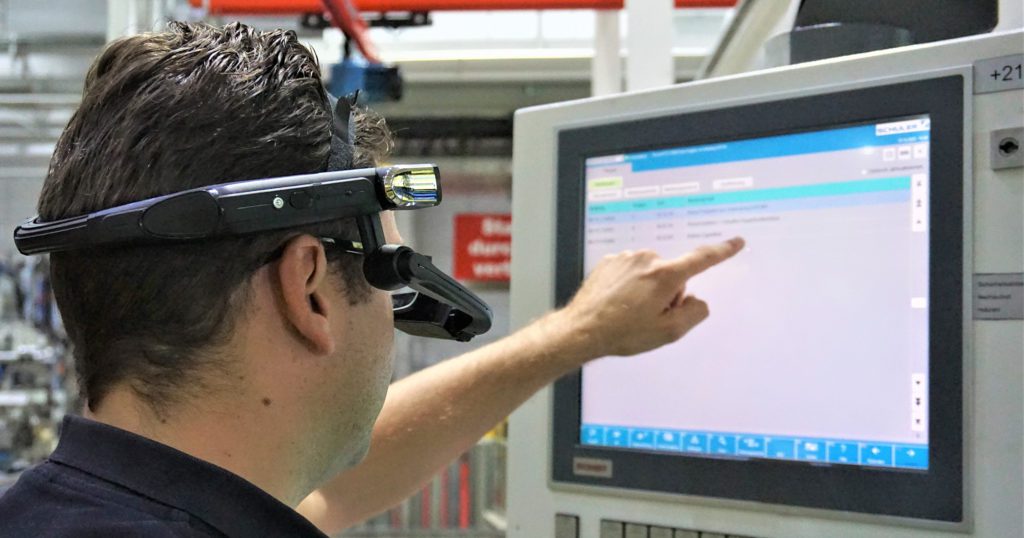
Canton, Michigan. August 25, 2021 – After a year off due to the pandemic, the FABTECH trade show will return to Chicago’s McCormick Place in September from the 13th through the 16th. At booth D46935, Schuler will not only present its latest servo and hydraulic press technology, but also its “Digital Suite” solutions for networking forming technology. They include, among others, “Visual Die Protection” which prevents unwanted production shutdowns and “Schuler Connect” which offers fast assistance in resolving unforeseen problems.
“Without a FABTECH show last year, we are especially looking forward to exhibiting in Chicago this September,” Kevin McAllister, President of Schuler North America, points out. “We will bring lots of exciting developments that we would love to show to our customers, because our solutions can really make their lives easier. As the largest service provider of any press supplier in North America, we’re anxious to highlight our service capabilities and offerings.”
Schuler’s “Cloud Solutions,” e.g., can be used to retrieve data on press forces and stroke rates. Cooling and lubrication circuits, temperatures and system pressures as well as power consumption are also recorded and visualized. Schuler also recently established a new U.S. workshop with a 50-ton crane that significantly expands the service footprint, especially the ability to execute large modernization projects.
For more information, please visit:
https://digitalsuite.schulergroup.com
For further information on Schuler Inc., North America, please contact:
Kevin McAllister, President, North America
Schuler Incorporated
7145 Commerce Blvd.
Canton, MI 48187 USA
734-207-7200
Kevin.McAllister@schulergroup.com
About the Schuler Group – www.schulergroup.com
Schuler offers customized first-rate technology in all areas of forming – from the networked press to press shop planning. In addition to press, our product includes automation and software solutions, dies, process know-how and service for the entire metalworking industry. Our customers include automotive manufacturers and suppliers, as well as companies in the forging, household appliance and electronics industries. Press from the Schuler Group mint coins for more than 180 countries. When it comes to the digital transformation of the forming technology, we support our customers worldwide as a supplier of innovative system solutions. Founded in 1839 with headquarters in Göppingen, Germany, Schuler AG has about 5,000 employees at production sites in Europe, China and America, as well as service companies in more than 40 countries. The company is part of the international technology group ANDRITZ.
Continue reading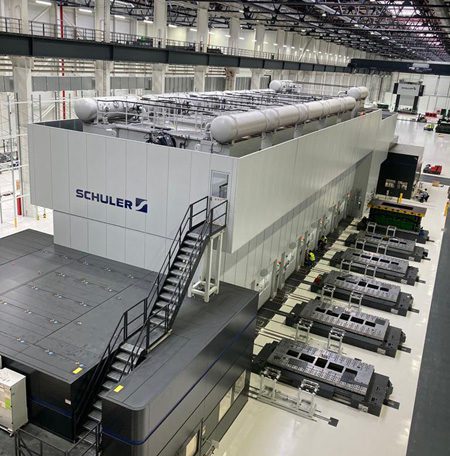
Göppingen/Halle, 07/27/2021 – At the beginning of June, Porsche and Schuler began the operation of a fully-connected press shop in East German Halle (Saale). In addition to a servo press line with an output of up to 20 strokes per minute, the Smart Press Shop also features a state-of-the-art blanking line; a Laser Blanking Line 2.18 equipped with two cutting heads for processing strip material with a width of up to 1,880 mm.


Blanking lines with lasers do not require expensive and heavy blanking dies, which is why they are particularly suitable for the production of new parts or small batch sizes with frequent product changes. The continuously moving coil material is processed into blanks at high cutting speeds. Thanks to tooling-free scrap separation, a high output is also achieved. A gentle transport of sensitive materials, such as aluminum, is ensured, too.
The Laser Blanking Line is the ideal solution for the “Smart Press Shop” in Halle, which focuses on the production of aluminum outer skin parts in small batch sizes. By recording various measured values of the system as well as the coil material and by smart marking of the blank, the line which supplies the blanks for the servo press line forms the point of departure for a “Track and Trace” system.
For further information on Schuler Inc., North America, please contact:
Kevin McAllister, President, North America
Schuler Incorporated
7145 Commerce Blvd.
Canton, MI 48187 USA
734-207-7200
Kevin.McAllister@schulergroup.com
About the Schuler Group – www.schulergroup.com
Schuler offers customized first-rate technology in all areas of forming – from the networked press to press shop planning. In addition to press, our product includes automation and software solutions, dies, process know-how and service for the entire metalworking industry. Our customers include automotive manufacturers and suppliers, as well as companies in the forging, household appliance and electronics industries. Press from the Schuler Group mint coins for more than 180 countries. When it comes to the digital transformation of the forming technology, we support our customers worldwide as a supplier of innovative system solutions. Founded in 1839 with headquarters in Göppingen, Germany, Schuler AG has about 5,000 employees at production sites in Europe, China and America, as well as service companies in more than 40 countries. The company is part of the international technology group ANDRITZ.
Continue reading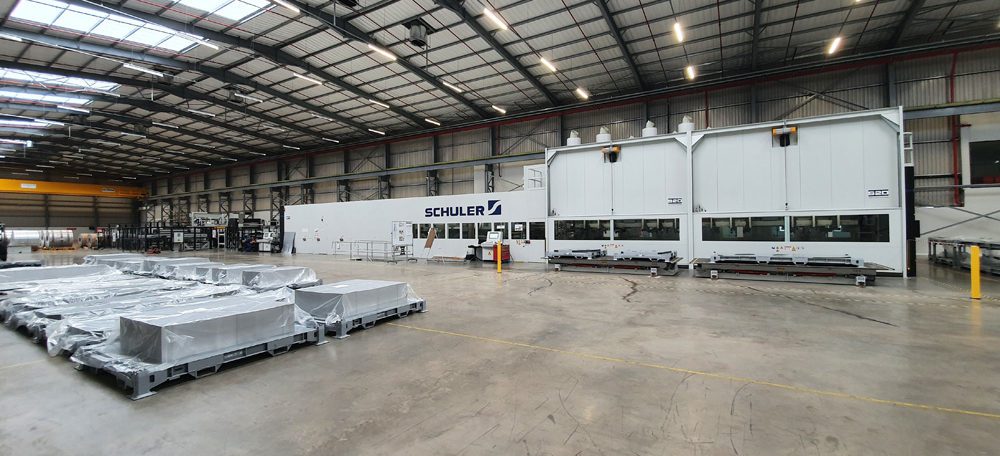
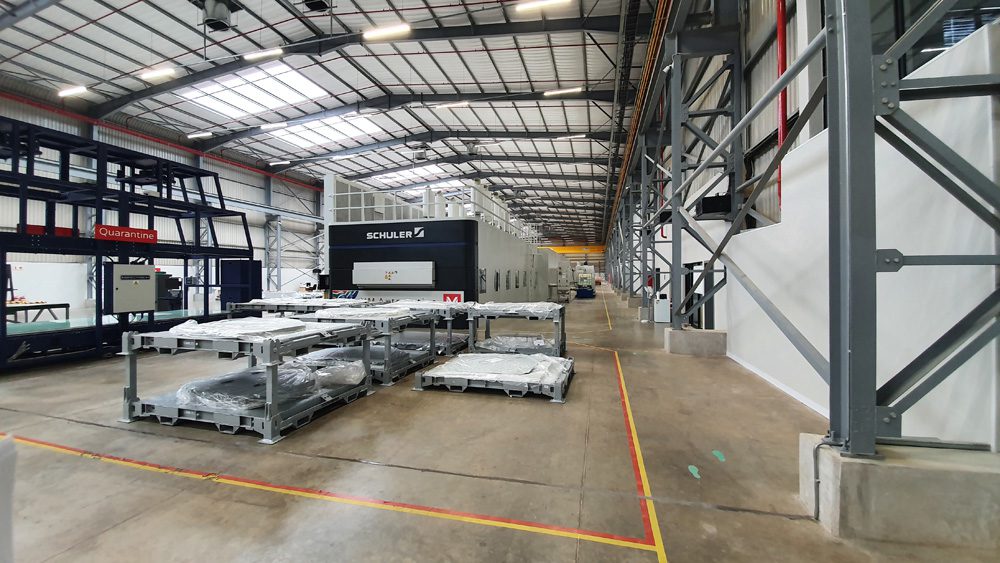
The German press manufacturer Schuler has numerous manufacturing and service locations worldwide. This ensures that customers can receive fast and efficient support from local Schuler employees. In the Americas, for example, there are sites in the USA, Mexico, and Brazil, ready to support one of the company’s latest innovations: the Laser Blanking Line.
Laser blanking makes it possible to manufacture blanks completely without dies. Instead of using presses or shears, the geometries are cut by two or three high-precision laser heads. This has several advantages: no dies, die change, die storage or die maintenance, but also no costly press foundation and no loop pit. The technological development of laser performance, combined with intelligent line automation, enables Schuler to achieve cutting speeds of up to 100 meters per minute (approx. 328 ft/min).
The design of a Laser Blanking Line is very similar to a conventional press cutting line. “Simply said, the press is only replaced by a laser cell,” explains Oswald Schoenberger, Product Manager for Laser Blanking Lines. “Operators who already have experience with conventional blanking lines can learn to handle the system very quickly, but even the ones without blanking experience the system can be operated intuitively and reliably after completing our training program,” he continues.
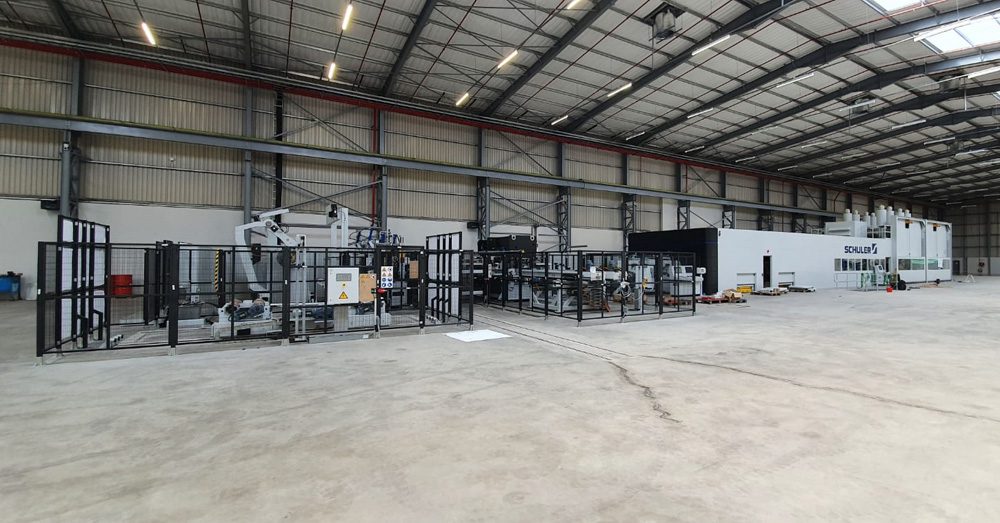
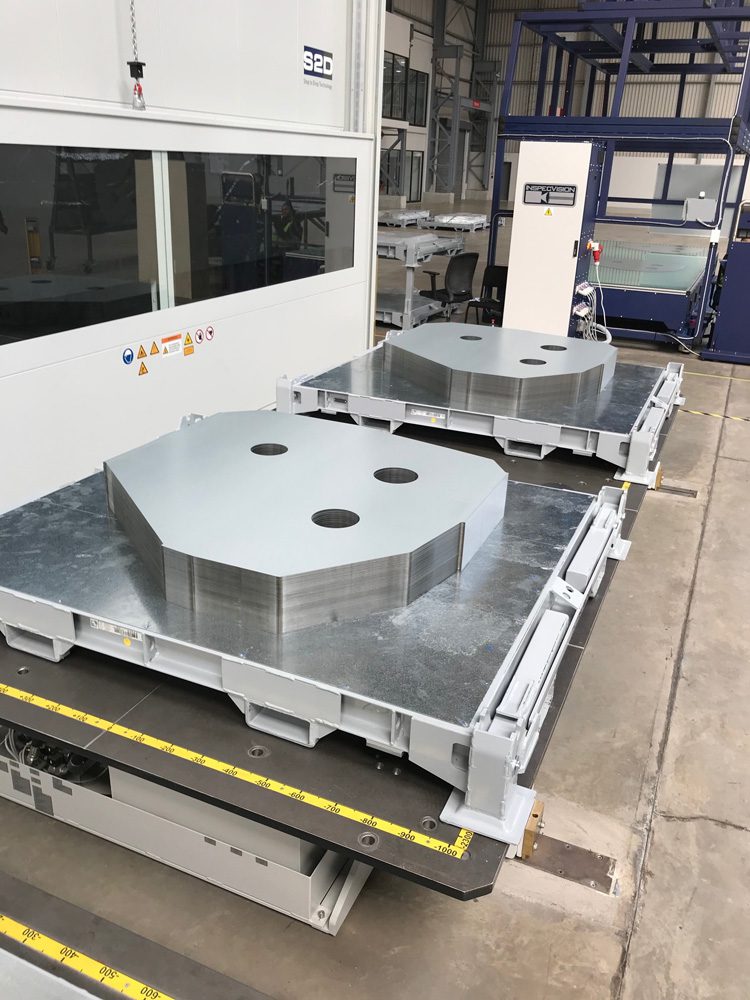
Programming the lasers also requires no process know-how thanks to LBL Studio. The offline program is so intelligent that cutting contours for new parts are automatically created based on CAD files. The optimal cutting distribution of the lasers is taken into account and reliable predictions about the output can be calculated in advance. Of course, changes can be made manually at any time.
With several lines around the world and production experience since 2012, Schuler is by far the leader in terms of laser blanking lines. “This is also related to our strong local service,” explains Telvi Zanin, Vice President of Service. In addition to Europe and Asia, Schuler also has long established service and manufacturing locations in North America. Schuler Inc. was founded in 1978 in Columbus, Ohio, and now has its headquarters close to Detroit in Canton, Michigan.
“With our team of 80 qualified service employees we are ready to provide high quality technical support to all our customers in North America”, says Telvi. A team from the U.S. has been sent to the product centers in Europe to join the in-house assembly where they can learn firsthand the laser blanking technology. “Our trained employees can thus react quickly and provide optimal on-site service”, says Telvi. “In addition, remote service like with Schuler Connect offers the possibility of immediate assistance from our headquarters in Canton, Michigan or from our experts in Germany if required – for established products as well as for innovations such as the Laser Blanking Line.”
www.schulergroup.com/laserblanking
About the Schuler Group – www.schulergroup.com
Schuler offers customized cutting-edge technology in all areas of forming—from the networked press to press shop planning. In addition to presses, our products include automation and software solutions, dies, process know-how and service for the entire metalworking industry. Our customers include automobile manufacturers and automotive suppliers, as well as companies in the forging, household appliance and electrical engineering industries. Presses from the Schuler Group mint coins for more than 180 countries. When it comes to the digital transformation of forming technology, we support our customers worldwide as a supplier of innovative system solutions. Founded in 1839 at our headquarters in Göppingen, Germany, Schuler AG has approx. 5,000 employees at production sites in Europe, China and the Americas, as well as service companies in more than 40 countries. The company is majority-owned by the Austrian ANDRITZ Group.
For further information on Schuler Inc., North America, please contact:
Guido Broder, Vice President of Sales & Marketing
Schuler Incorporated
7145 Commerce Blvd.
Canton, MI 48187 USA
734-207-7200
Guido.Broder@schulergroup.com
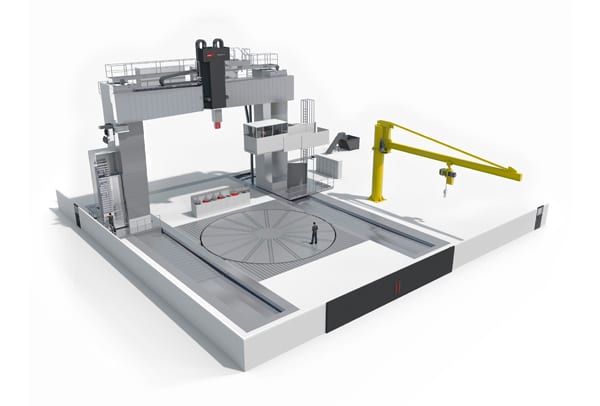
The Australian Government (Commonwealth of Australia) selected French company Naval Group to deliver a fleet of 12 regionally superior submarines, to be known as the Attack Class, for the Royal Australian Navy. The Attack class fleet will be built in a modern submarine construction yard in Osborne, South Australia.

The Future Submarine Program will deliver Australia a capability that can be built, operated and maintained autonomously, which maximizes opportunities for Australian industry throughout all phases of the program.
As the design of the Attack Class progresses, Naval Group continues to deliver on its commitment and achieve this goal in cooperation with their suppliers that now includes the Starrag Group. Dr Marcus Queins, Manager for the Large Parts Machining Systems business unit at Starrag, explains, “We are proud to be involved in this prestigious project in Australia.” Starrag has been selected to supply a Droop+Rein G 110TT HR100 C vertical gantry machine, capable of handling both large hull elements and high-precision components for submarine construction. With traversing paths of 14,000 x 13,000 x 3,500 mm (45.93 x 42.65 x 11.48 ft) in the X/Y/Z axes and an 11 m (36 ft) turntable, the gantry will be the largest machine tool ever put into service in Australia.
Starrag is collaborating with the Australian machine tool manufacturer H&H Machine Tools Australia to deliver this critical equipment. H&H will manufacture key components, supply qualified personnel to help install the gantry and provide technical support for the entire life cycle of the machine, securing an ongoing role in servicing and maintenance in the future. Starrag will provide H&H with the necessary expertise through onsite training and quality control, transferring critical skills and autonomous ability to Australian industry.
The contract was awarded following a complex selection process. Noting its many years of experience and its extensive, as well as technical, expertise in handling large, complicated projects, the Starrag Group was deemed a worthy selection for this contract. Few machine suppliers can manage an order of this magnitude from over 15,000 kilometers (9320 miles) away — but this was not a problem for the Starrag Group, as Australian sales partner H&H Machine Tool Solutions will facilitate local work, ensuring that everything runs smoothly onsite. A previous project carried out in South Australia, for which Starrag supplied four machines for aircraft construction, demonstrates a proven track record, in this regard.
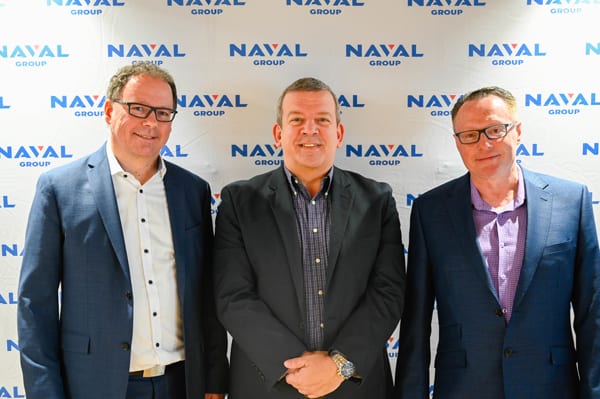
Gantry machine for precise heavy-duty cutting of large and heavy workpieces
The size and efficiency of the milling machine being supplied, which is also capable of turning components thanks to the integrated rotary table – tried and tested as part of the Dörries range of lathes from the Starrag Group – was of fundamental importance. The Droop+Rein G 110 TT HR100 C owes its high precision to features such as the hydrostatic guides in all linear axes, as well as the thermo-symmetrical design of the milling unit with its integrated C axis. Milling heads can be changed automatically via a head change interface. The team responsible selected five different machining heads to use on this project. The high-performance fork milling head features not only the ability to use the tool at any angle but also the necessary prerequisites for heavy-duty machining on five axes simultaneously. Alternatively, the machine can be used with one straight and one angled 100-kW (134HP) milling head with a torque of 7,500 Nm (5531 ft-lb). A turret and a horizontal facing head are available for turning operations on the components.
The large, multifunctional machine supplied by Starrag from its Bielefeld plant gives the operator optimum access. The operator can reach any point on the workpiece thanks to the spacious cabin, which travels along the gantry and features the latest Siemens operator panel. The cabin can reach a height of 8 m (26 ft) and be moved towards the center of the table.
The last but by no means the least decisive factor in favor of the Starrag Group was that, having already supplied machines to reference customers, the company could prove that the installed machine technology is very robust. This ensures that, with proper maintenance, the machine will be operational for the entire duration of the submarine project. The first of the Attack Class submarines will be delivered in the early 2030’s and continue into the early 2050’s.
Company profile: Starrag
High-precision machine tools for greater productivity
Starrag Group is a global technology leader in manufacturing high-precision machine tools for milling, turning, boring and grinding workpieces of metallic, composite and ceramic materials. Principle customers are internationally active companies in the Aerospace, Energy, Transportation and Industrial sectors (Industrial Components, Luxury Goods, Med Tech). In addition to its portfolio of machine tools, Starrag Group provides integrated technology and maintenance services that significantly enhance customer quality and productivity.
The umbrella brand Starrag unites the product ranges Berthiez, Bumotec, Dörries, Droop+Rein, Ecospeed, Heckert, Scharmann, SIP, Starrag, TTL and WMW. Headquartered in Rorschach, Switzerland, the Starrag Group operates manufacturing plants in Switzerland, Germany, France, UK and India and has established a network of sales and service subsidiaries in the most important customer countries.
The shares of Starrag Group Holding AG are listed on the SIX Swiss Exchange.
For further information:
Starrag
Michael Schedler
Head of Marketing
Tel. +49 2166 454 0
info@starrag.com
www.starrag.com

With products like servo press lines, Schuler reached consolidated sales of € 1.136 billion in 2019. © Schuler
As expected, the strategic realignment of press manufacturer Schuler resulted in high one-off burdens on earnings in 2019. Due to cyclical effects, new orders were down but performed much better than the German machine tool industry as a whole. Consolidated sales reached € 1.136 billion (prior year: € 1.212 billion). Earnings before interest, taxes and goodwill amortization (EBITA) fell to minus € 75.5 million (plus € 45.3 million).
As part of its future concept, Schuler invested heavily in 2019 in the restructuring of its manufacturing sites; in its focus on core competencies in press construction, automation and service; and in the strengthening of the Group’s innovation capabilities. The company has thus responded to the far-reaching structural changes taking place in the global automotive industry.
“Group’s inner strength permits extensive realignment”
“As a press manufacturer, Schuler is part of the dramatic transformation of the global automobile industry toward electromobility, autonomous vehicles, and digital networking. In 2019, we identified and began to implement the resulting strategic and structural consequences for our company,” stated CEO Domenico Iacovelli at the presentation of the company’s results for fiscal year 2019 in Göppingen, Germany.
“This obviously had a significant impact on earnings. However, there was no alternative. Schuler has the financial strength, the global footprint, and the technological quality to be able to withstand such a one-off burden for the workforce, the balance sheet, and earnings in a market environment characterized by challenging transformation processes and political risks. This makes us confident that we can expand our leading position in metalforming technology in the medium term and thus achieve better results once again,” added Iacovelli.
Normal operating business slightly profitable
Together with the previously announced writedowns on the intangible goodwill of subsidiaries AWEBA and Yadon, the structural measures to realign the company amounting to € 84 million, and other one-off items, Schuler recognized negative special items of almost € 96 million in 2019. Net income after taxes was minus € 121.9 million (plus € 13.5 million). In its normal operating business – in other words EBITA before restructuring costs – Schuler generated a slightly positive result of € 8.5 million in a very challenging business environment.
New orders well above one billion euros
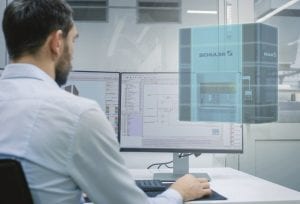
In the future, Schuler will strengthen its offerings in the field smart networking, among others. © Schuler
Schuler started its fiscal year 2020 with an order backlog of € 868 (€ 926) million. New orders received in 2019 amounted to € 1.092 (€ 1.255) billion. Europe accounted for the largest share of new orders (€ 562 million, thereof Germany € 293 million), followed by the Americas region (€ 253 million), and China (€ 221 million). With a decline in consolidated new orders of 13 percent in 2019, Schuler performed much better than the German machine tool industry as a whole, which suffered a decline of 22 percent according to the latest figures of sector association VDW.
Schuler CFO Thomas Kamphausen explained that the company had borne the full load of costs incurred by its structural adjustments in 2019. “We do not anticipate any further significant additional special items in 2020. Major cost reductions resulting from our structural adjustments are to be expected as early as 2021,” he said. “As far as our regular business development in 2020 is concerned, it is too early to estimate any effects of the Corona virus disruptions on our revenue and profits at this point.”
At the end of 2019, Schuler’s equity ratio amounted to 35.4 (40.1) percent – and was thus still above the industry average. The number of Group employees fell to 6,276 (6,574). At year-end 2019, headcount in Germany amounted to 3,962 (4,195).
Future concept: focus, localization and innovation
Announced in summer 2019, Schuler’s future concept is based on three main pillars. As the name CORE suggests, Schuler will focus in the future on its core business of building cutting-edge presses, as well as the optimization and digitalization of automation systems for the manufacturing processes of its internationally operating clients in the automotive, industrial, hydraulic and other sectors. In addition, Schuler is systematically strengthening its offerings in the field of service and smart networking.
In 2019, Schuler sold its die construction unit for the production of car body panels to Deutsche Werkzeugbau, a company set up by a strategic investor group. However, its core business of cutting-edge die construction for customers in the metalforming industry was spun off from Schuler Pressen GmbH and established as a separate growth business under the umbrella of the AWEBA Group, a subsidiary of Schuler.
Schuler Innovation Rate 2019 grows to 45.4 percent
The second pillar of Schuler’s future concept is a significant acceleration of new development and time-to-market processes in the field of press construction. The Group’s calculation basis for this objective, the Schuler Innovation Rate (SIR), doubled to 45.4 (prior year: 22.9) percent in 2019. This figure indicates that current product innovations accounted for almost half of all new orders received in Schuler’s main business fields of Automotive, Hydraulic and Industry during the past fiscal year. This enabled Schuler to offset a large part of the reduced demand from the automobile industry for classic forming technology products.
The third pillar of the future concept is a strict focus on localizing production and added value. Together with Group investment Yadon, Schuler China mainly serves customers throughout Asia. Schuler’s Brazilian operations focus in particular on the North and Latin American markets. Germany remains the location for machines and equipment produced for Schuler’s European customers. The high quality standards at all sites create a manufacturing network which can flexibly balance out peaks in demand between the regions. Within Germany, Schuler has pooled its press production in Erfurt and is expanding its home base in Göppingen to become a central innovation site. In the coming months, an additional service center with its own production and assembly capabilities serving customers throughout Germany will also be set up in Göppingen.
Schuler Group at a glance (IFRS)
About the Schuler Group – www.schulergroup.com
Schuler offers customized first-rate technology in all areas of forming – from the networked press to press shop planning. In addition to press, our product includes automation and software solutions, dies, process know-how and service for the entire metalworking industry. Our customers include automotive manufacturers and suppliers, as well as companies in the forging, household appliance and electronics industries. Press from the Schuler Group mint coins for more than 180 countries. When it comes to the digital transformation of the forming technology, we support our customers worldwide as a supplier of innovative system solutions. In its fiscal year 2019, Schuler posted sales of € 1.136 billion. Founded in 1839 with headquarters in Göppingen, Germany, Schuler AG has about 6,000 employees at production sites in Europe, China and America, as well as service companies in more than 40 countries. The company is majority-owned by the Austrian ANDRITZ Group.
For further information on Schuler Inc., North America, please contact:
Guido Broder, VP
Schuler Incorporated
7145 Commerce Blvd.
Canton, MI 48187 USA
734-207-7200
info@schulerinc.com
www.schulergroup.com